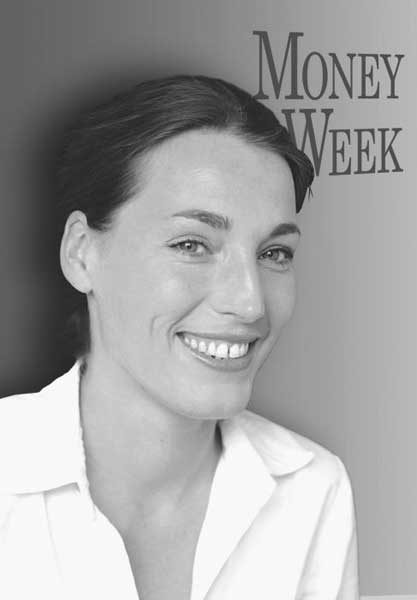My Life In Media: Merryn Somerset Webb
'Predicting the credit crunch and global recession was relatively easy because it was so obvious. But I have no idea what happens next. It's new economic territory'

Merryn Somerset Webb, 38, is the editor of MoneyWeek, the UK's best-selling financial magazine. She has taken the magazine's circulation from 8,000 in 2003 to 35,000 today, and can regularly be seen and heard on BBC current affairs shows discussing the credit crunch, housing crash and rising food prices – topics she was headlining in MoneyWeek before they became a staple of the mainstream press. She lives in Paddington, central London, and is married, with a two-year-old daughter and another on the way.
What inspired you to embark on your career in media?
Wanting to educate people about money and finance. There is so much information about money out there and so many publications on money, but so little real information that goes to the heart of the problems in the financial industry.
When you were 15, which newspaper did your family get? Did you read it?
I lived in the States until I was 15, where we got The Herald Tribune. I remember reading the cartoons at the back.
What were your favourite TV and radio programmes?
I went to boarding school in the UK and we weren't really allowed to watch television, but we did watch Top of the Pops and the news, and we listened to Radio 1.
Describe your job.
I edit MoneyWeek, which involves everything from holding the editorial meetings in the mornings and deciding the general direction of the magazine to the nitty gritty of each story.
What media do you turn to first thing in the morning?
Radio 4.
Do you consult any media sources during the day?
I look on Bloomberg and the BBC website for news updates. I have a Bloomberg camera in my office that I look at a lot. I read all the newspapers every morning, starting with the tabloids and working through to the Financial Times, and then I read the London Evening Standard as soon as it comes out in the afternoon.
What do you tune into when you get home?
I watch very little television apart from crime shows like The Bill, property shows and the odd documentary.
What is the best thing about your job?
The variety. The magazine covers everything, because there is almost nothing that isn't affected by the economy or that affects the economy. I can talk to anybody about anything and I have lunch with all sorts of fascinating people. It's an amazing time to be a financial journalist. While predicting the credit crunch and global recession was relatively easy because it was so obvious, I have no idea what happens next. It's new economic territory.
And the worst?
Deadlines. As soon as you finish one issue, there's another one to start on.
How do you feel you influence the media?
As a magazine we have been really ahead of the game in looking at the things that have happened this year. We picked up on a lot of the big themes in global finance very early, from the bubble in commodities to the one in housing.
What's your proudest working achievement?
A few weeks ago MoneyWeek became the best-selling financial magazine in the UK; that's from a standing start in eight years. I always thought we would get there but I'm amazed that we have. It's an extraordinary achievement for a small-budget magazine like us.
And what's your most embarrassing moment?
I was in a discussion group on the Today programme last year and a very respected economist said he didn't think the credit crunch could be considered a crisis. Instead of reacting in an intelligent way I got the giggles, because it seemed like such an enormous crisis to me. For weeks afterwards people said they had heard me giggling on the Today programme.
What is your Sunday paper? And do you have a favourite magazine?
My first read on a Sunday is The Sunday Times, but I get them all apart from the tabloids. I read everything from Grazia to The Ecologist but I most look forward to getting Private Eye. The Week is also quite close to the top of my list, which is odd because I read all the newspapers, but I still find things in there that I have missed. Harper's Bazaar is my favourite fashion magazine.
Is there a career ambition you want to realise before you retire?
To take the circulation of MoneyWeek to another level. If I could get it to 50,000 I could retire happy.
What would you be doing if you weren't in the media?
I'd still be in the City, where I started out. I would still be a stockbroker, and it would be a hell of a lot less interesting.
Who in the media do you most admire and why?
Gillian Tett, an assistant editor of the FT. I think that no one in the City would understand what has happened in the global economy if it wasn't for her. I also greatly admire James Harding, a contemporary of mine at Cambridge, who I think is extraordinarily clever to be editing a national paper [The Times] at such a young age.
The CV
1992: Moves to Japan to produce programmes for NHK
1993: Works as an institutional broker for SBC Warburg
1998: Begins writing on finance for The Week, returning to the City a year later
2000: MoneyWeek launches
2003: Starts column for the Sunday Times
2007: Publishes book Love Is Not Enough – The Smart Woman's Guide to Making (and Keeping) Money
2008: Becomes a Financial Times columnist
Join our commenting forum
Join thought-provoking conversations, follow other Independent readers and see their replies
Comments
Bookmark popover
Removed from bookmarks